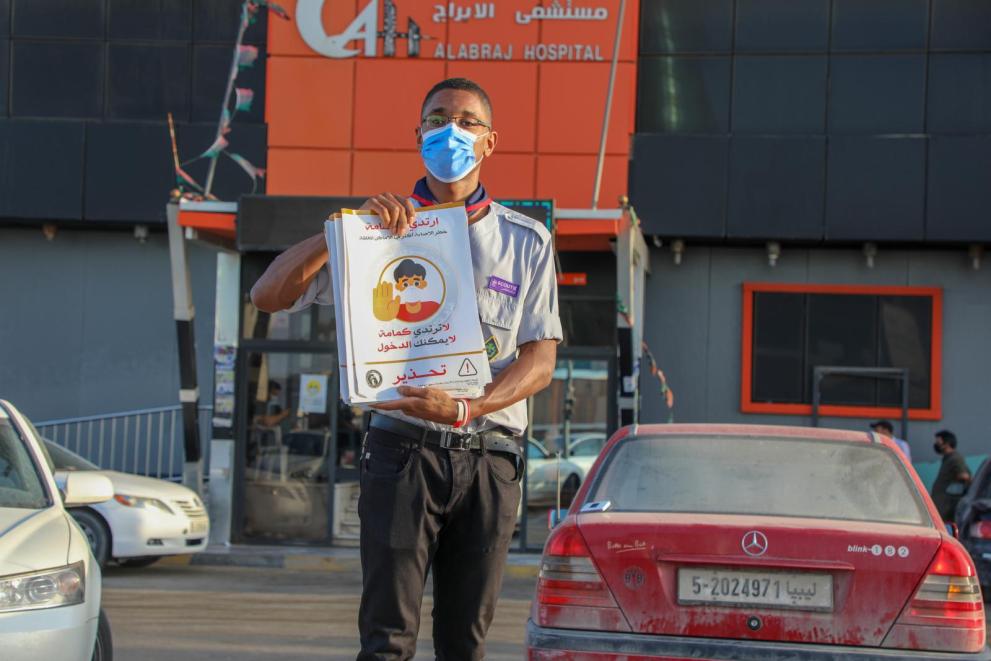
The European Union’s (EU) €20 million “Protecting most vulnerable population from the COVID-19 pandemic in Libya” (“Salamati” = “My Safety”) programme provides coordinated support to Libyan authorities to respond to the COVID-19 pandemic in Libya. Working in partnership with the International Organization for Migration (IOM), the United Nations Children’s Fund (UNICEF) and the World Health Organization (WHO), the EU’s COVID-19 response programme is expected to reach 4.8 million people across Libya.
Since the first COVID-19 cases in Libya in early 2020, more than 133,000 cases have been confirmed and 2,180 died as a result of COVID-19 infection. Due to low testing capacities, the World Health Organization expects actual numbers to be higher. The EU and the IOM, UNICEF and WHO have joined forces under a €20 million (LYD 33 million) programme to support the Libya authorities in its response to COVID-19 pandemic and the implementation of the preventive measures to control the spread of the pandemic.
“A global pandemic can only be tackled through global cooperation. The European Union is therefore working closely with countries and partner organizations around the world to foster protection measures and infection tracking, bring forward research in treatment and vaccines, and to make vaccines available and accessible for as many as possible. In Libya, the EU seeks to both support the national COVID-19 response and strengthen primary health care services, as the Libyan health system is suffering severe undersupplies and damages as a consequence of the longstanding conflict,” said the EU Ambassador to Libya, José Sabadell.
Funneled by the imperative of ‘Leaving no one behind’ and continued access to quality essential basic services for all, the “Salamati” programme works on improving national detection and surveillance mechanisms, boosting preventive measures and supporting Libya’s national health system. Through different, closely coordinated interventions, IOM, UNICEF and WHO are expected to reach about 4.8 million people in their COVID-19 prevention and response, including those in hard-to-reach areas and most vulnerable ones.
“The past year has proved that global collaboration is inevitable to combat the pandemic. In Libya, together with our partners we work to scale up the national response, protect health workers on the front line as we coordinate to achieve our goal of equitable distribution of the COVID-19 vaccine,” said Dr. Badereddin Annajar, Director General of NCDC, Libya.
The WHO works closely with the Ministry of Health and the National Centre for Disease Control to support the country’s response to COVID-19. WHO has supported the development and implementation of the COVID-19 National Response Plan and provides technical support for key pillars including maintaining essential health services, training staff on the case management of COVID-19, expanding diagnostics capacity in laboratories, and strengthening rapid response teams. It has trained almost 1500 health care workers on different topics related to COVID-19. WHO has also worked to secure Libya’s participation in the COVAX Facility, a global initiative that will allow countries to purchase an agreed number of COVID-19 vaccines at a guaranteed price. The Organization is working with the national authorities on preparations for implementing the national vaccination plan.
The UNICEF worked intensively on increasing awareness among the local population about the Coronavirus and effective protection measures. This included, for example an awareness campaign in partnership with the University of Misrata, the Boy Scouts and Girl Guides Association of Libya, and the Libyan Association for Medical Students; and training on Infection, Prevention and Control (IPC) measures for staff members of the National Center for Disease Control (NCDC) in Tripoli. UNICEF rehabilitated four health facilities in the south under this grant and two are near completion.
The IOM conducted hygiene promotion and awareness-raising campaigns about COVID-19 in detention centres. Migrants in detention are exposed to poor ventilation and have very limited access to fresh air, light and safe water, leaving them vulnerable and more exposed to health risks associated with poor hygiene and diseases. IOM also conducted workshops to strengthen emergency preparedness and response to the COVID-19 pandemic for points of entry in Libya.
Background:
The EU’s “Protecting most vulnerable populations from the COVID-19 pandemic in Libya” (“Salamati” = “My Safety”) programme to support the Libyan national response to the COVID-19 pandemic is financed by the North of Africa window of the European Union’s Emergency Trust Fund for Africa (EUTF Africa). The €20 million programme is implemented by the World Health Organization, the International Organization for Migration and the United Nations Children’s Fund since August 2020.
Details
- Publication date
- 8 March 2021
- Region and Country
- Libya
- Thematic
- Improved migration management
